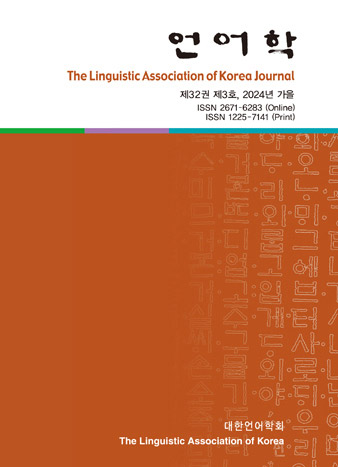대한언어학회 전자저널

-
Machine Translation of Idiomatic Expressions and Slang Based on Korean Drama
-
In Support of the Non-Derivational Analysis of Korean Ditransitive Constructions
-
ChatGPT-integrated English Writing: Writing Strategies and Perceptions
-
On the Differences between American and British English Bible Versions with Reference to get Passive
32권 3호 (2024년 9월)
- Machine Translation of Idiomatic Expressions and Slang Based on Korean Drama
-
Sungran Koh
Pages : 45-63
Abstract
Keywords
# idiomatic expressions # slang # ChatGPT # translation # Korean-to-English
References
- Abdulhaq, S. (2017). Machine translation: The cultural and idiomatic challenge, Journal of Al-Azhar University, 19(2), 1-28. https://digitalcommons.aaru.edu.jo/al azhar/vol19/iss2/9
- Aguilar, R. (2023). A guide to translating slang into other languages. Weglot. ttps://www.weglot.com/blog/translate-slang
- Basil, H., & Jeremy, M. (2004), Translation an advanced resource book, London and New York: Routledge
- Baziotis, C., & Mathur, P., & Hasle, E. (2023). Automatic evaluation and analysis of idioms, Proceedings of the 17th Conference of the European Chapter of the Association for Computational Linguistics, 3682-3700, https://aclanthology.org/ 2023.eacl-main.267
- Hsu, J. A. (2014). Error classification of machine translation a corpus-based study on Chinese-English patent translation. Translation Studies, 18(4), 121-136.
- Jiao, W., Wang, W., Huang, J., Wang, X., & Tu. Z. (2023). Is Chatgpt a good translator? a preliminary study. https://www.researchgate.net/publication/ 367359399_Is_ChatGPT_A_Good_Translator_A_Preliminary_Study
- Kim S.-Y. (2014). Study on pragmatic use of Korean idiomatic expressions with a focus on variation tendencies, Journal of the International Network for Korean Language and Culture, 11(3), 23-46
- Lee, C. (2022). Suggestion for the phraseological teaching and learning of Korean idiomatic expressions. Bilingual Research, 89, 169-192.
- Lee, S.-Y. (2023). Korean Slang Expressions, Longtail Books.
- Li, H., Graesser, A. C., & Cai, Z. (2014). Comparison of Google translation with human translation. In W. Eberle & C. Boonthum-Denecke (Eds.), Proceedings of the 27th International Florida Artificial Intelligence Research Society Conference (pp. 21-23). Florida, USA.
- Liu, D. (2017). Idioms: Description, comprehension, acquisition, and pedagogy. Routledge.
- Mohamed Z. H., & Shafeen, M. N. (2017). A brief study of challenges in machine translation. IJCSI International Journal of Computer Science Issues, 14(2), 54-57.
- Vilar, D., Xu, J., d'Haro, L. F., & Ney, H. (2006). Error analysis of statistical machine translation output. Proceedings of the 5th international Conference of Language Resources and Evaluation (LREC). pp. 697-702. Genoe, Italy.
- Volk, M. (1999). The automatic translation of idioms: Machine translation vs. translation memory systems. Computer Science Linguistics. DOI: 10.5167/UZH- 19070
- Wisniewski, G., & Kbler, N., Yvon, F. (2014). A corpus of machine translation errors extracted from translation students' exercises. Proceedings of the Ninth International Conference on Language Resources and Evaluation (LREC'14), 3585-3588. http://www.lrec-conf.org/proceedings/lrec2014/pdf/1115_Paper.pdf
- Yehoshua, B. (1953). Some linguistic problems connected with machine translation. Retrieved from http://www.mt-archive.info/Bar-Hillel-1953.pdf on 18 November 2015 (p.221-223)